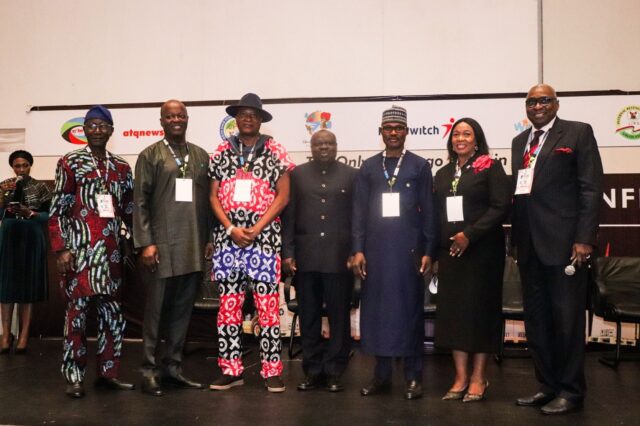
Nigeria has adopted a proportional insurance framework designed to ensure risk-sharing between the aviation and insurance sectors, aligning with global best practices.
A new addendum to Chapter 5 of the Prudential Guidelines introduces a 10% mandatory retention of aviation insurance in Nigeria, ensuring a net account for local insurance companies.
This complements the established rule that 20% of aviation risk must be insured locally, while up to 70% may be reinsured abroad, creating an environment that reassures lessors and financiers and encourages aircraft leasing in Nigeria.
Model to Ensure Risk-Sharing
Deputy Commissioner of National Insurance Commission (NAICOM), Dr. Usman Jankara, announced the reforms at the 5th CHINET AviaCargo Conference. He explained that the framework followed extensive consultations with international stakeholders, including a high-level engagement with the International Aviation Working Group in Dublin.
He added that the 10% retention rule emerged from consultations with the aviation working group after deliberations in Dublin. “We met with the subcommittee four times. Their position, supported by experiences in India, Brazil, Indonesia, and Malaysia, was that the proportion of risk retained locally could be reduced to encourage international participation. That discussion led to the circular, or addendum, we issued,” he said.
Aligning with Global Aviation Insurance
Dr. Jankara emphasized that the proportional model is a decisive step to ensure risk-sharing in ways that clear misconceptions about Nigeria’s aviation insurance. He said the new system guarantees compliance with international standards.
“What that has done is provide certainty and align what we’re doing in Nigeria with what obtains in the global markets. As we speak today, Nigeria is fully compliant with aviation insurance practice globally,” he stated.
He added that the 10% retention requirement ensures Nigerian insurers always participate in high-value policies, rather than acting merely as conduits to foreign markets. This safeguard, combined with the 20:70 ratio, reassures international lessors that Nigerian insurers have genuine exposure in every aviation deal.

Building Synergy Through Protection
At the heart of NAICOM’s reforms is a commitment to ensure risk-sharing that protects aviation stakeholders, airlines, operators, and financiers, who depend on insurance as a safeguard against financial loss.
“Everything we have done as NAICOM has always been geared towards ensuring adequate protection of insurance policyholders. And who are these policyholders? They are all of you aviation stakeholders present here this morning,” Dr. Jankara said.
He stressed that insurance is a promise to compensate when risks materialize, and NAICOM’s mandate is to ensure risk-sharing that makes that promise enforceable.
Tackling the Premium Misconception
Dr. Jankara also addressed claims that Nigerian airlines pay unusually high premiums. He clarified that pricing is not fixed locally but shaped by global risk assessments.
“The pricing for aviation risk is not solely done within Nigeria. It is actually done in consultation with the international market. Whatever pricing you get is an offshoot of the extent of the risk you bring to the market. To solve this, we have engaged aviation stakeholders to ensure risk-sharing and better understanding,” he explained.
Domestication, Retention, and Cut-Through Clause
NAICOM reinforced the domestication rule, requiring that any airline or aviation asset in Nigeria must first be insured locally with a NAICOM-licensed insurer. Only after exhausting local capacity can risks be taken abroad.
“For any airline or insurable asset in Nigeria, it must be insured with a company licensed and regulated by the National Insurance Commission. We recognize that as an industry we may not always have the capacity to reinsure 100 percent of aviation risks locally. That is why the rule is clear: retain at least 10% on Nigerian books, ensure 20% is insured locally, and only then may 70% go abroad. This system is built to ensure risk-sharing between Nigerian insurers and global reinsurers,” Dr. Jankara explained.
To further reassure financiers, NAICOM introduced the cut-through clause. This allows direct payouts from foreign reinsurers if local insurers cannot meet obligations, providing certainty that claims will be settled regardless of jurisdictional issues. The clause complements the retention and domestication rules to ensure risk-sharing is credible and enforceable.
Aviation–Insurance Synergy
Together, the 10% retention rule, the 20:70 ratio, domestication enforcement, and the cut-through clause form a strategy to ensure risk-sharing that strengthens cooperation between aviation and insurance. Airlines benefit from predictability, local insurers expand capacity, and financiers gain assurance of compliance with international standards.
By adopting these reforms, Nigeria joins peers such as India and Brazil in designing frameworks that ensure risk-sharing is both practical and transparent. The changes signal stronger cooperation between aviation and insurance industries, guaranteeing that when risks materialize, the promise of protection remains credible and enforceable.























